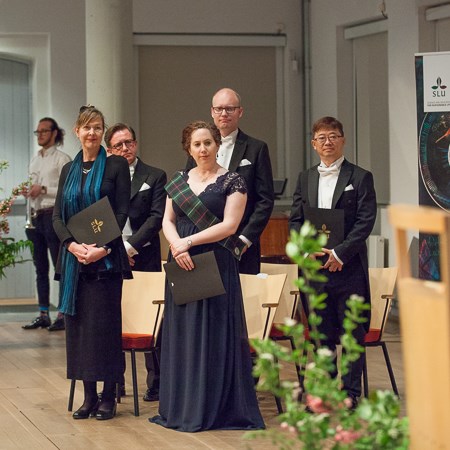Five professors were installed the 10th of May in Alnarp. They represent different research areas, but they all try to find solutions to challenges we are facing today.
- Lisa Diedrich (professor of landscape architecture) is a design researcher in landscape architecture and urbanism, engaged in fostering transdisciplinary research through critical thinking about practice. She especially investigates how abandoned industrial landscapes can be transformed with the help of designers into urban places for the common public. She claims that landscape architects can act as change agents for a more sustainable life on the urbanising planet.
- Laura Grenville-Briggs Didymus (professor of integrated plant protection) specialises in the biology and genetics of fungal-like organisms called oomycetes, many of which are serious plant pathogens. Her current research focuses on sustainable strategies for the control of potato late blight and other diseases that are caused by such "water moulds". These strategies include the use of biological control, and her research group has shown that oomycetes can also be beneficial. For example, the oomycete Pythium oligandrum is very effective at feeding on damaging oomycetes and fungi, including the potato late blight pathogen.
- Thomas B. Randrup's (professor of urban open spaces management) research concerns the management and governance of urban open spaces, primarily green spaces in urban areas. Management raises "hands on-issues" ranging from strategic development to maintenance of different types of open spaces. Governance concerns the involvement of citizens in leadership, policies and implementation of methods for strategic decision-making. How management and governance can support the supply of urban ecosystem services, including social benefits, is an important issue.
- Johan Stenberg's (professor of integrated plant protection) research area includes interactions between plants and their pests. His early studies concerned wild plants, but today he focuses on the more vulnerable cultivated crops, especially in horticulture. In his research, he tries to understand how different ecology-based plant protection measures can be combined to combat pests and promote beneficial organisms in cultivations. The goal is to create a bouquet of measures that together provide future growers with an effective and environmentally friendly plant protection.
- Jean Yong (professor of horticultural growing systems) and his colleagues have developed a sustainable way of plant production, reducing the reliance on chemical fertilisers through the use of organic amendments containing natural biostimulants. Using an earthworm-plant model for research, they have found that the growth process in plants is promoted by various phytohormones and other unknown substances. Jean Yong also studies the biological functionality of greenery in landscape environments – it provides positive social, economic and environmental benefits.
